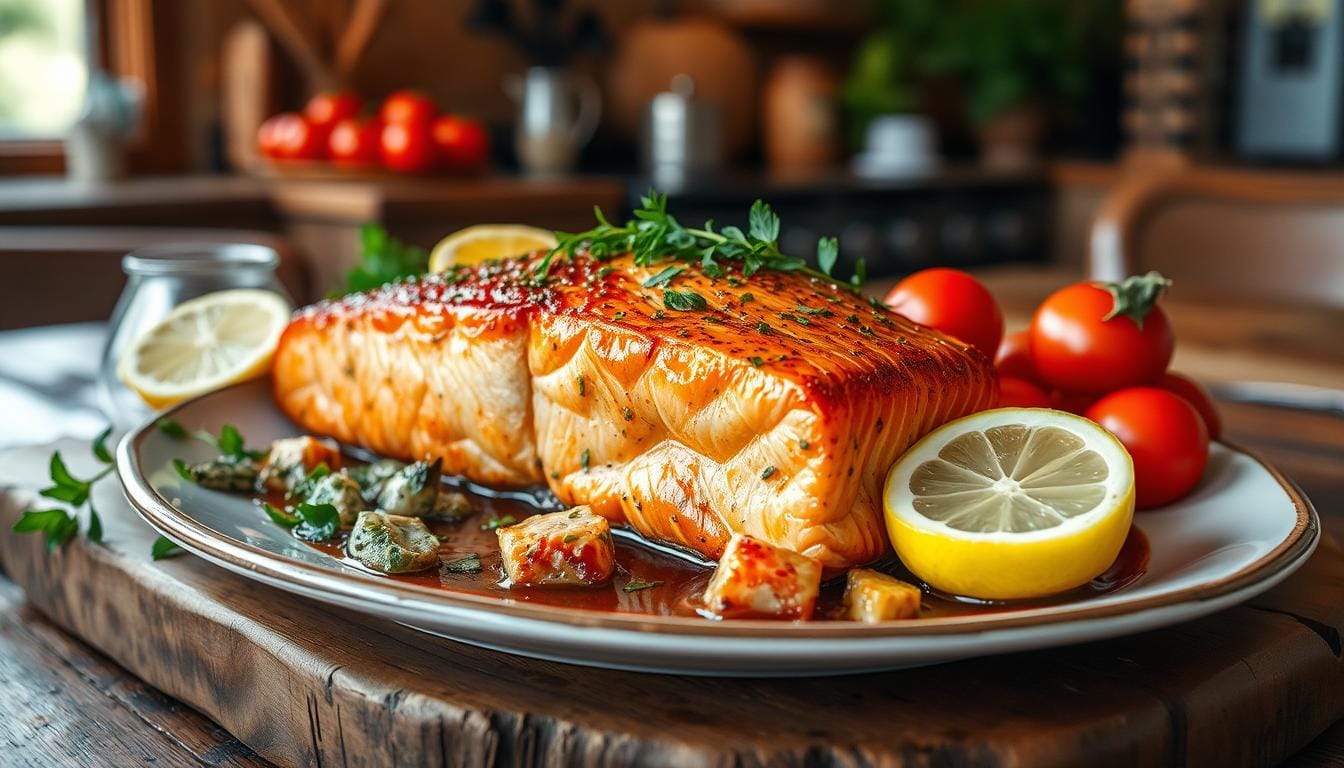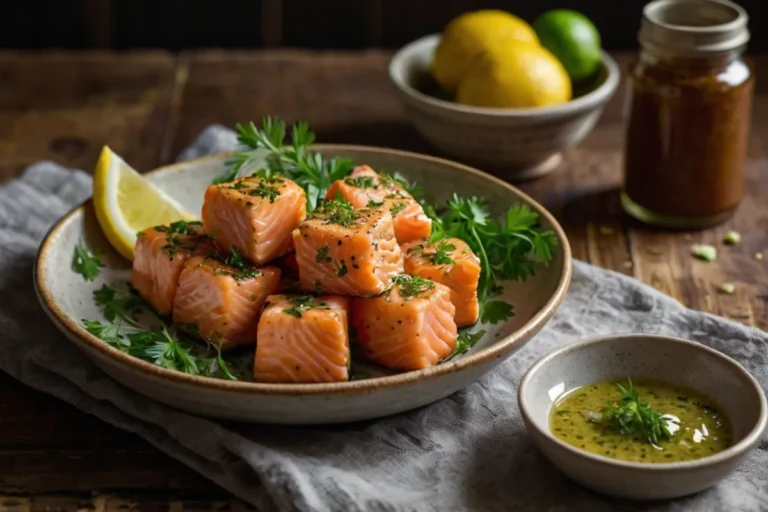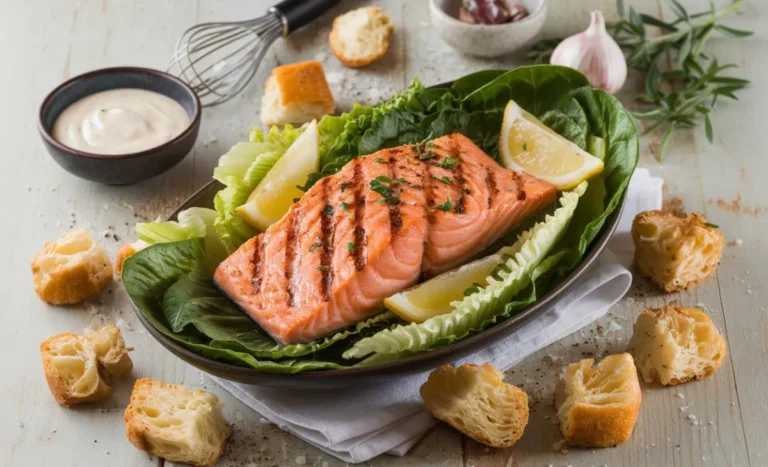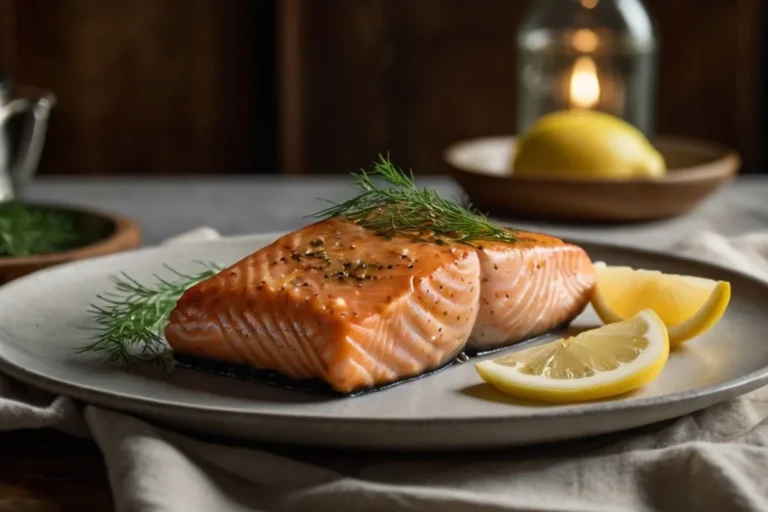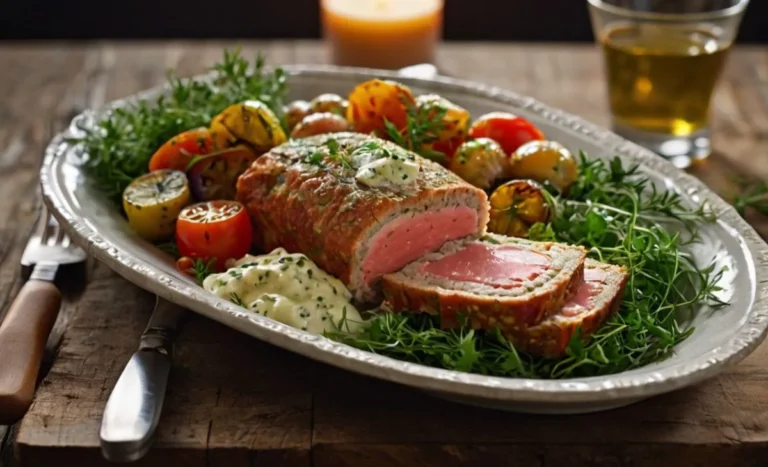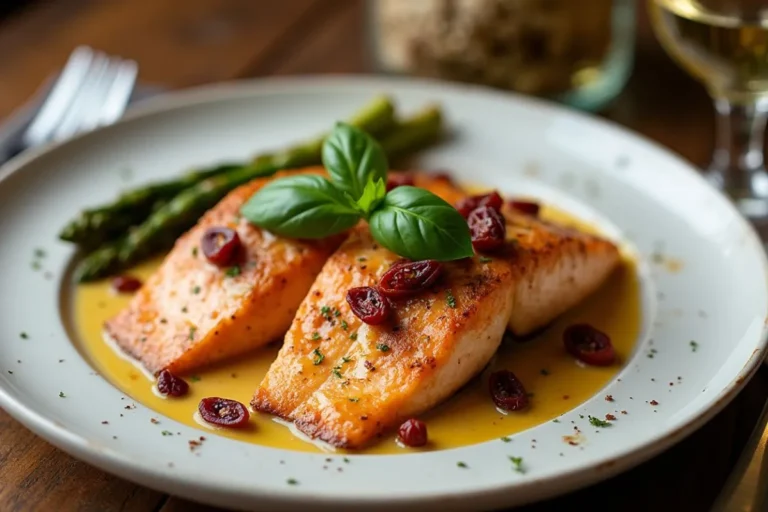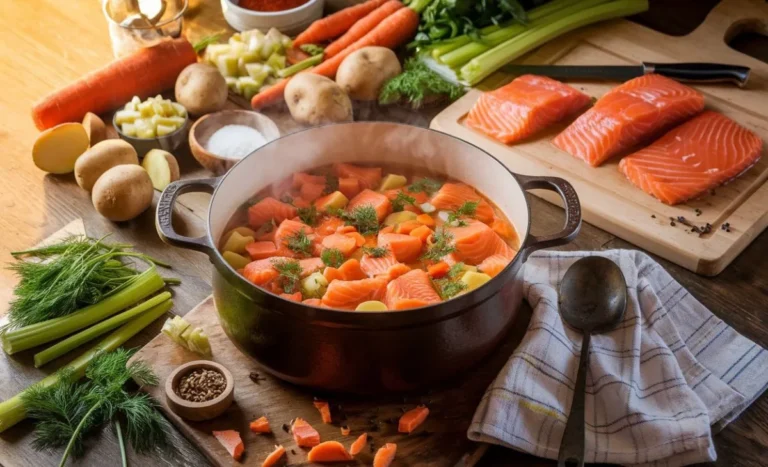How to Cook Salmon Belly: Easy Homemade Recipe
Salmon belly is a special cut of fish that’s often overlooked. It’s rich and flavorful, with a buttery texture. This part of the salmon is packed with nutrients like omega-3 fatty acids and vitamin D.
In this recipe, we’ll teach you how to cook salmon belly perfectly. We’ll focus on simple seasoning and cooking methods. This way, you can enjoy its natural flavors and pair it with light side dishes.
Key Takeaways
- Salmon belly is a versatile and affordable cut of fish with a unique texture and flavor profile.
- Salmon belly is packed with essential nutrients like omega-3 fatty acids, vitamin D, and protein.
- This recipe focuses on simple seasoning and cooking techniques to bring out the best in salmon belly.
- Salmon belly can be pan-seared, baked, or grilled, and pairs well with a variety of sauces and side dishes.
- Proper storage and reheating methods will ensure you can enjoy your salmon belly leftovers for up to 3-5 days.
Understanding Salmon Belly’s Unique Properties
Salmon belly is a prized cut known for its nutritional benefits and culinary excellence. It offers a distinct taste and texture that stands out. This makes it a favorite among health-conscious and discerning food lovers.
Nutritional Benefits and Fat Content
Salmon belly is famous for its high omega-3 fatty acids, which are good for the heart. It has more healthy fats than leaner fish parts. This makes it rich and luxurious to eat.
This fat content also boosts its nutritional value. So, salmon belly is a very nutritious choice.
Texture and Flavor Profile
Salmon belly has a tender, melt-in-your-mouth texture. Its high fat content makes it velvety and luxurious. This texture enhances the dining experience.
In terms of taste, salmon belly has a richer flavor than leaner salmon. It delights the palate with its depth and richness.
Why Choose Salmon Belly
Adding salmon belly to your dishes offers a luxurious seafood experience. It’s also packed with nutrients. This makes it a great choice for those looking for a healthy and tasty meal.
Whether you’re making gourmet salmon belly dishes or exploring its salmon belly nutrition, it’s worth trying. It’s a must-try for any seafood lover.
Selecting Fresh Salmon Belly
When picking the perfect salmon belly, look for vibrant color and a fresh smell. Wild-caught salmon bellies are better, with better texture and taste. Make sure the fish is free of scales and bones and feels firm and moist.
If you’re using frozen salmon belly, thaw it fully and pat it dry before cooking. This keeps the texture and flavor great, helping you get the best results.
- Look for a bright, vivid color in the salmon belly
- Ensure the fish has a fresh, ocean-like scent
- Opt for wild-caught salmon bellies for superior quality
- Check for a firm, moist texture with no visible scales or bones
- Fully thaw and pat dry frozen salmon belly before cooking
Choosing the freshest and best salmon belly will help you make a delicious dish. It will also look great, showing off the fish’s unique qualities.
“Salmon belly is a true delicacy, prized for its rich, buttery texture and exceptional flavor. Selecting the freshest, most pristine belly is the first step in unlocking its full potential.”
Essential Kitchen Tools and Equipment
Cooking salmon belly needs some key tools and equipment for the best taste. The right cookware and temperature control devices are crucial. They make a big difference in your cooking and the dish’s quality.
Recommended Cookware
A non-stick pan or a well-seasoned cast-iron skillet is best for cooking salmon belly. These pans distribute heat evenly and prevent the salmon belly from sticking. Also, a baking sheet is great for oven cooking, like roasting or baking the salmon belly.
Temperature Control Tools
It’s important to check the salmon belly‘s internal temperature. A good meat thermometer is essential. It helps you cook the salmon belly just right, without overcooking or undercooking it.
Preparation Utensils
Proper preparation is key for salmon belly. You’ll need a sharp knife for filleting and removing bones. Tongs or a fish spatula are useful for flipping and handling the salmon belly. For marinating, use glass or ceramic bowls to avoid reactions with acidic ingredients.
With the right tools and equipment, cooking salmon belly becomes smooth and successful. You’ll get delicious and perfectly cooked results every time.
Proper Preparation Techniques
To get the best flavor and texture from salmon belly, follow a few key steps. First, rinse the salmon belly under cold water and dry it well with paper towels. This removes any scales or bones left from butchering.
Some chefs suggest scoring the salmon belly skin in a crosshatch pattern. This helps seasonings and marinades get into the flesh better. It makes the dish more evenly cooked and flavorful.
For marinating, mix soy sauce, minced garlic, brown sugar, and mirin (rice wine). Let the salmon belly soak in this mix for 30 minutes, turning it now and then. Make sure to dry the salmon belly before cooking for crispy skin.
“The key to perfectly cooked salmon belly is in the preparation. Taking the time to properly clean, score, and marinate the fish will result in a truly delicious and memorable meal.”
Good preparation makes your salmon belly dish more tasty and enjoyable. With these steps, you’ll make a salmon belly recipe that will wow everyone.
How to Cook Salmon Belly: Step-by-Step Guide
Want to improve your cooking skills? Learn how to make delicious salmon belly. It’s easy, whether you’re new to cooking or have some experience.
Seasoning and Marination
Begin by seasoning the salmon belly with salt, pepper, and fresh herbs. Mix soy sauce, citrus juice, and herbs for a tasty marinade. Let it marinate for 30 minutes to blend the flavors.
Cooking Temperature Guidelines
Controlling the temperature is crucial when cooking salmon belly. Use medium-high heat for pan-searing and 425°F (220°C) for oven-baking. These settings help achieve a crispy outside and a juicy inside.
Timing and Doneness Indicators
- For pan-searing, cook for 3-4 minutes on each side. The flesh should be opaque and flake easily.
- In the oven, bake for 10-12 minutes. The internal temperature should be 145°F (63°C).
- Check for visual signs like opaque flesh and crispy edges to know when it’s done.
Remember, don’t overcook the salmon belly. Keep an eye on it and adjust cooking time for the perfect doneness.
“Salmon belly is a hidden gem in the seafood world, boasting a rich, buttery texture and an abundance of beneficial nutrients.”
Pan-Searing Method for Crispy Skin
Getting the perfect pan-seared salmon belly is easier than you think. The secret is in how you prepare and cook it. This way, you get a golden-brown crust and a tender, flavorful inside.
First, make sure the salmon belly is dry. Use a paper towel to pat the skin side dry. This step is key for that crispy texture.
Then, heat a skillet over medium-high heat. Add some oil like olive or avocado oil. When the oil starts shimmering, put the salmon belly, skin-side down, in the pan. Don’t move it until the skin is golden, about 3-4 minutes.
When the skin is crispy and golden, it will come off the pan easily. Flip the salmon and cook for another 2-3 minutes. This way, you get a pan-seared salmon belly that’s crunchy on the outside and soft inside.
This simple pan-searing method can turn a simple salmon belly into a standout dish. With a few tricks, you can impress everyone with your cooking skills.

Baking and Grilling Alternatives
While pan-searing is a popular method for cooking baked salmon belly, there are other ways to add unique flavors and textures. Let’s look at oven-baking and grilling tips to enhance your grilled salmon belly experience.
Oven-Baked Technique
To bake your salmon belly, preheat your oven to 425°F (218°C). Line a baking sheet with parchment paper. Place the seasoned salmon belly pieces on it. Bake for 10-12 minutes, watching closely to avoid overcooking.
The result will be a flaky, tender interior with a lightly crisped exterior.
Grilling Tips and Tricks
For a smoky flavor, fire up the grill to medium heat. Lightly oil the grates to prevent sticking. Place the fish skin-side down and grill for 5-6 minutes per side.
Resist moving the salmon belly too soon. This helps the skin sear and get that perfect crunch.
Both oven-baking and grilling offer unique and delicious results. Feel free to experiment to find your favorite. Whichever method you choose, the salmon belly‘s rich flavor will make for a satisfying meal.
Creating the Perfect Sauce Pairings
When making salmon belly recipes, the right sauce is key. Salmon belly’s rich flavor needs light, zesty sauces. A Japanese-style soy yuzu sauce is perfect, bringing out the fish’s natural taste.
To make this sauce, mix soy sauce, yuzu or lemon juice, and toasted sesame oil. The citrus from the yuzu or lemon cuts the salmon’s richness. Soy sauce and sesame oil add depth and umami. You can also use the marinade to make a reduction sauce, adding more flavor.
Other great pairings include herb-infused and citrus-based sauces. These light sauces balance the salmon’s fattiness. They make for a harmonious and balanced meal.
| Sauce Pairing | Key Ingredients | Flavor Profile |
|---|---|---|
| Soy Yuzu Sauce | Soy sauce, yuzu or lemon juice, toasted sesame oil | Zesty, umami-rich, balanced |
| Herb-Infused Sauce | Fresh herbs (e.g., parsley, dill, basil), lemon juice, olive oil | Bright, aromatic, refreshing |
| Citrus-Based Sauce | Orange, lemon, or lime juice, honey, Dijon mustard | Tangy, slightly sweet, vibrant |
The secret to great sauce pairings for salmon belly recipes is balance. Choose light, zesty, and flavorful sauces. They should enhance the fish’s unique taste and texture.
Side Dish Recommendations
When choosing side dishes for salmon belly, aim for a balance. You want to enhance the rich flavor without overpowering it. Choose light, vibrant options that contrast nicely with the salmon.
Complementary Vegetables
- Steamed asparagus drizzled with lemon and olive oil
- Roasted cherry tomatoes tossed with garlic and fresh basil
- A crisp, mixed green salad with a tangy vinaigrette
- Sautéed spinach with a touch of garlic and crushed red pepper
- Grilled or roasted bell peppers, zucchini, and onions
Grain and Starch Options
- Fluffy jasmine rice or quinoa
- A light, lemon-herb pasta dish
- Creamy mashed potatoes or roasted sweet potatoes
- A refreshing quinoa salad with dried cranberries and toasted almonds
- Japanese-inspired sides like miso soup or a spinach salad with ginger dressing
It’s important to balance the flavors on your plate. This lets the salmon belly be the star. Pair it with these light, vibrant sides for a complete and satisfying meal.
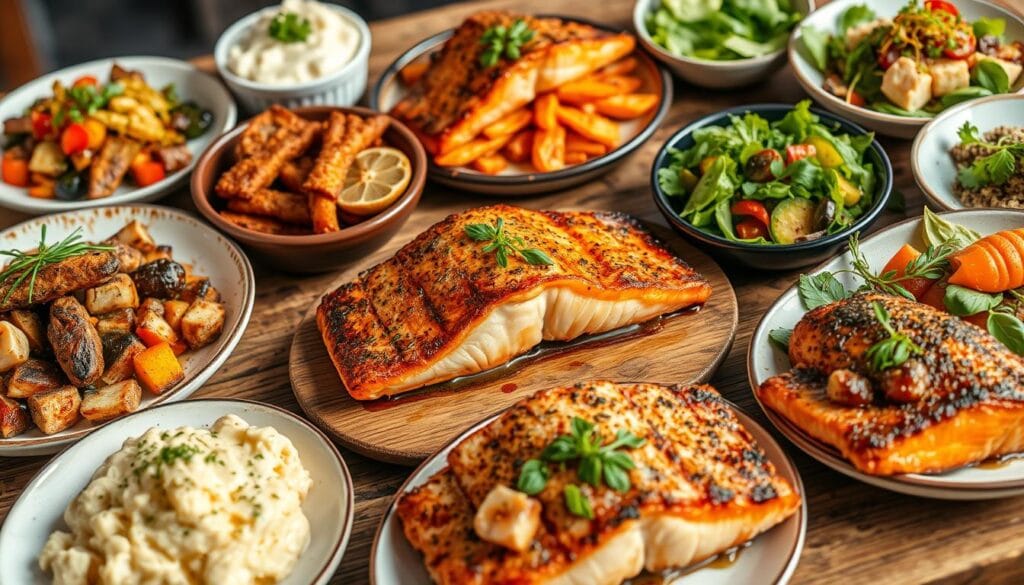
| Side Dish | Preparation Time | Difficulty Level |
|---|---|---|
| Steamed Asparagus with Lemon | 15 minutes | Beginner |
| Roasted Cherry Tomatoes with Garlic and Basil | 20 minutes | Beginner |
| Mixed Green Salad with Tangy Vinaigrette | 10 minutes | Beginner |
| Sautéed Spinach with Garlic and Red Pepper | 12 minutes | Beginner |
| Grilled Vegetables (Bell Peppers, Zucchini, Onions) | 25 minutes | Intermediate |
| Fluffy Jasmine Rice | 20 minutes | Beginner |
| Lemon-Herb Pasta | 30 minutes | Intermediate |
| Quinoa Salad with Cranberries and Almonds | 25 minutes | Intermediate |
| Miso Soup | 20 minutes | Beginner |
| Spinach Salad with Ginger Dressing | 15 minutes | Beginner |
These side dishes offer a mix of flavors and textures to go with your salmon belly. Try different combinations to find your favorite.
Plating and Presentation Tips
Creating a delicious and beautiful salmon belly dish starts with how you plate it. Follow these easy tips to turn your dish into a masterpiece.
Begin by placing the salmon belly on a bed of steamed veggies or quinoa. Drizzle the sauce around the plate or over the fish. Add green onions, sesame seeds, or a lemon wedge for freshness and beauty.
Use the rule of thirds to arrange the plate’s elements. Divide the plate into three parts and place the ingredients for balance. Or, arrange them in a circle for a different look.
Play with colors and textures to make your dish pop. The fish’s creamy texture and crunchy garnishes will impress your guests.
The dining experience is about more than just taste. Thoughtful plating can make your dish even more special. It shows off your cooking skills.
Storage and Leftover Guidelines
Proper storage and handling of leftover cooked cooking salmon belly is key to food safety and flavor. Here are some important guidelines to follow:
After cooking, store leftover cooking salmon belly in an airtight container in the fridge. It stays fresh for 3-5 days. When reheating, do it gently to keep the fish moist. You can use leftover cooking salmon belly in salads, pasta, or rice bowls for a tasty meal.
For the best taste, eat leftover cooking salmon belly within 2 days. If you have raw cooking salmon belly, cook or freeze it within 1-2 days of buying for quality and safety.
| Storage Method | Recommended Shelf Life |
|---|---|
| Refrigerated (cooked) | 3-5 days |
| Frozen (raw) | 1-2 days from purchase |
Remember, proper food handling and storage are crucial for the safety and quality of your cooking salmon belly. By following these tips, you can enjoy its delicious flavors for days.
Conclusion
Cooking how to cook salmon belly at home is a tasty and healthy choice. You can make salmon belly recipes just like restaurants with the right steps. Try out different flavors and cooking ways to find your favorite.
Salmon belly is packed with good stuff like omega-3s, protein, and vitamins. It’s easy to cook well, whether you pan-fry, bake, or grill it. This way, you get to enjoy its soft texture and deep flavor.
Adding how to cook salmon belly and salmon belly recipes to your cooking list is great for your health and taste. It’s a flexible ingredient that makes your meals both delicious and nutritious.
FAQ
What are the nutritional benefits of salmon belly?
Salmon belly is packed with omega-3 fatty acids, great for your heart. It has more fat than other fish parts, making it taste rich and feel luxurious in your mouth.
How do I choose the best salmon belly?
Look for salmon belly with a bright color and a fresh smell. Wild-caught is better for taste and texture. Make sure it’s free of scales and bones and feels firm and moist.
What tools are needed for cooking salmon belly?
You’ll need a non-stick pan or a cast-iron skillet for searing. A baking sheet is good for oven cooking. A meat thermometer checks if it’s cooked right. A sharp knife is needed for filleting, and tongs or a spatula for flipping.
How do I prepare salmon belly for cooking?
Rinse the salmon belly under cold water and dry it with paper towels. Remove scales and bones. Some chefs score the skin to help seasonings get in and cook evenly.
What are the best methods for cooking salmon belly?
You can pan-sear, bake, or grill salmon belly. Pan-sear at medium-high heat for 3-4 minutes each side. Bake at 425°F for 10-12 minutes. Grill at medium heat for 5-6 minutes each side.
How can I achieve crispy skin on salmon belly?
Dry the salmon belly well before cooking. Use a skillet with oil on medium-high heat. Cook skin-side down until it’s crisp and easy to remove, about 3-4 minutes.
What sauces and sides pair well with salmon belly?
Use light, zesty sauces like soy yuzu to balance the richness. Pair it with sides like steamed asparagus, roasted cherry tomatoes, or a crisp salad.
How should I store leftover cooked salmon belly?
Store it in an airtight container in the fridge for 3-5 days. Reheat gently to keep it moist. You can use it in salads, pasta, or rice bowls.
Source Links
- Japanese Baked Salmon Belly | 13 Minutes – https://lcarecipes.com/japanese-baked-salmon-belly/
- Crispy Air Fryer Salmon Belly Recipe – https://www.melaniecooks.com/air-fryer-salmon-belly/51648/
- Salmon Belly Recipe: A Quick and Flavorful Delight – https://www.spicemeatrecipes.com/salmon-belly-recipe-a-quick-and-flavorful-delight/
- The Top 10 Salmon Recipes of All Time – https://www.simplyrecipes.com/top-10-salmon-recipes-8697870
- salmon – Raincoast Wanderings – https://raincoastwanderings.com/tag/salmon/
- From Ocean to Plate: Find the Secrets of Perfect Salmon Belly – https://puripangan.co.id/find-secrets-perfect-salmon-belly/
- Salmon Belly Recipe: Simple & Flavorful – https://tastiquerecipes.com/salmon-belly-recipe/
- Salmon Lox Recipe – Wholesome Yum – https://www.wholesomeyum.com/lox-recipe/
- Pan Seared Salmon – https://www.wellplated.com/pan-seared-salmon/
- How to Smoke Salmon at Home – https://www.seriouseats.com/how-to-smoke-salmon-recipe-8621746
- Steamed Salmon, Shanghai Style – https://thewoksoflife.com/steamed-salmon-shanghai-style/
- Cooking Salmon at Home for the Holidays – https://chefpliska.com/2023/12/28/cooking-salmon-at-home-for-the-holidays/
- Air Fryer Salmon with Crispy Skin – https://cookthestory.com/air-fryer-salmon-with-crispy-skin/
- How to Cook Salmon for Dogs: Easy Recipes for Food & Treats – https://www.wikihow.com/Cook-Salmon-for-Dogs
- A Mouthwatering Salmon Belly Recipe – Foodeez Junction – https://foodeezjunction.com/salmon-belly-recipe/
- How to Cook Salmon Belly? – https://www.spicemeatrecipes.com/how-to-cook-salmon-belly/
- Pan Seared Salmon – Perfect Crispy Skin! (VIDEO) – CJ Eats Recipes – https://cjeatsrecipes.com/pan-seared-salmon-perfect-crispy-skin/
- Copycat Gordon Ramsay’s Pan Seared Salmon — Jazz Leaf – https://jazz-leaf.com/recipes-index-full/copycat-gordon-ramsays-pan-seared-salmon
- Salmon Belly Recipe: A Rich Seafood Delight – Me + Food – https://meplusfood.com/salmon-belly-recipe-a-rich-seafood-delight/
- Easy 15-Minute Grilled Salmon – Healthy Recipes Blog – https://healthyrecipesblogs.com/grilled-salmon/
- Air Fryer Salmon (Perfect In 10 Minutes!) – Wholesome Yum – https://www.wholesomeyum.com/air-fryer-salmon/
- Honey-Garlic Glazed Salmon Is The Weeknight Dinner We Keep Coming Back To – https://www.delish.com/cooking/recipe-ideas/a55762/honey-garlic-glazed-salmon-recipe/
- 10-Minute Sweet Chili Salmon – The Big Man’s World ® – https://thebigmansworld.com/easy-sweet-chilli-salmon/
- Lemon Butter Garlic Salmon – https://cafedelites.com/lemon-butter-garlic-salmon/
- What to Serve with Salmon: 25 Best Side Dishes – https://www.manettas.com.au/what-to-serve-with-salmon-25-best-side-dishes/?srsltid=AfmBOoocQSmioNnk3WROLf4kAE_0dHAZWpDg6LCp0XS8OPvJxrSBtVtk
- 25 Side Dishes to Serve with Salmon – https://www.tasteofhome.com/collection/side-dishes-for-salmon/?srsltid=AfmBOorysT5Meh0hISvmSCYByMA_S7xqUkQ__9j_Ov0P7xTkRINWURWb
- Secret Food Plating and Presentation Tricks that Fine Dining Restaurants Use – – https://blog.easyeat.ai/secret-food-presentation-tricks-that-fine-dining-restaurants-use/
- 6-Minute Air Fryer Salmon – The Big Man’s World ® – https://thebigmansworld.com/air-fryer-salmon/
- Selecting and Serving Fresh and Frozen Seafood Safely – https://www.fda.gov/food/buy-store-serve-safe-food/selecting-and-serving-fresh-and-frozen-seafood-safely
- Is It Okay To Eat Leftover Salmon? – https://www.southernliving.com/can-you-eat-leftover-salmon-8426136?srsltid=AfmBOoqasPaoyelt6G2w9LurkkJfr83_M54qV7B9tWt9EW3Ki11-muHN
- Salmon Belly Recipe: Your Go-To Guide for a Flavorful and Nutritious Meal – https://www.allrecipe-s.com/salmon-belly-recipe-2/
- Grilled Salmon Belly: The Best Recipe for a Tender, Flavorful Meal – https://www.spicemeatrecipes.com/grilled-salmon-belly-the-best-recipe-for-a-tender-flavorful-meal/

